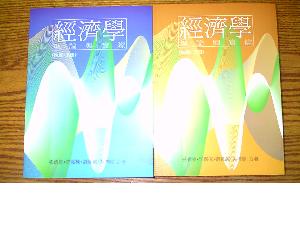
教科書:
經濟學(一) (二)
任課老師: 林建甫
辦公室: 台大經濟系 103研究室
電話: 23519641 轉 521 or 273
電子郵件:clin@ccms.ntu.edu.tw
網頁: http://ccsun57.cc.ntu.edu.tw/~clin
簡介:
有人說經濟學很難,也完全脫離現實。基本上,這樣的說法是完全錯誤的。經濟學是非常有用的科學,經濟學的思考,往往令你大開眼界。這門課就將帶給你這種截然不同的感受。因為經濟學是透過成本效益的分析,討論社會及個人如何做選擇的問題。這與人類的生活及文明無不息息相關。雖然在社會科學的範疇裡,沒有絕對的對或錯,但卻有一隻看不見的手:「價格機能」在作用,默默的導引「資源」的分派。在這裡面,沒有道德,沒有性別,只有人類的本(理)性。你會驚訝的發現原來冥懂的事情是這麼的清楚,不可知的過去與未來也都有了一些顯見的端倪。經濟學不僅僅是高尚的經世濟民,更不是狹義的銅臭分析;而是探討如何將有限的資源,在眾多的競爭上,生產不同的產品;然後再將產品如何的分配於不同世代的國家社會及最後的個人;對芸芸眾生而言,如何調配你的時間、金錢,甚至安排你的生活。這都是經濟學討論的重要課題。在這門課當中,我們將著重經濟學的原理原則的相關運用,來探討上述的問題;也夾雜一些總體經濟的簡單觀念,包括國民所得、經濟福利及財務金融,而報章雜誌中經濟及投資的術語也會有機會教育。大部份的經濟分析不可避免要用到數學,但本課程完全不用數學,而代之以口語化的推理及思考 。(可以不用有任何經濟學的背景。)
教科書:
經濟學理論與實際(上) (下): 張清溪, 許嘉棟, 劉鶯釧, 吳聰敏 合著 (2000年第四版)。
參考書:
賣桔者言:張五常著,
臺北市遠流出版社。改變歷史的經濟學家:海希朗爾 (Heilbroner, Robert L.)著; 蔡伸章譯台北市志文出版:新潮文庫287。
生活的經濟學:蓋瑞.貝克(Gary S. Becker),吉蒂.娜夏特.貝克(Guity Nashat Becker)著;薛迪安譯,臺北市:麥格羅.希爾出版社。
其他如:
張五常的其他書,吳惠林、熊秉元教授的書,我的文章都值得參考。 另外介紹兩個有名的經濟學網址 http://econwpa.wustl.edu/EconFAQ/EconFAQ.html,它是由美Southern Mississippi 大學的 Bill Goffe 所建的,是最早最 完整的網站。http://www.libraries.rutgers.edu/rulib/socsci/econ/econ.html#menua ,它是由美Rutgers大學圖書館圖書館所建的,有很 多相關資料。
歷屆考古題,幫助你思考。 上課參考資料,powerpoint 筆記,課本解答。
佈告欄報章雜誌剪報:結合現實經濟問題討論。
一些發人深省的經濟箴語:
"The Age of Chivalry is gone; that of sophisters, economists, and calculators has succeeded." -Edmund Burke
"All models are wrong, but some are useful." -G. Box
"Knowledge is the only instrument of production that is not subject to diminishing returns." -J.M. Clack
"You can make even a parrot into a learned political economist-all he must learn are the two words "supply" and "demand."
-Anonymous
"Of all monopolies, that of opinion is the worst." -G.J. Stigler
"The world will always be governed by self-interest. We should not try to stop this, we should try to make the self-interest of cads a
little more coincident with that of decent people." -S. Butler
"經濟學無所不能!" -林建甫
"天下大勢,合久必分,分久必合!" -羅貫中
Mankiw 認為要學經濟學的理由:
"Economics is a study of mankind in the ordinary business of life." So wrote Alfred Marshall, the great nineteenth-century economist, in his textbook, Principles of Economics. Although we have learned much about the economy since Marshall's time, this definition of economics is as true today as it was in 1890, when the first edition of his text was published.
Why should you, as a student soon to enter the twenty-first century, embark on the study of economics? There are three reasons.
The first reason to study economics is that it will help you understand the world in which you live. There are many questions about the economy that might spark your curiosity. Why are apartments so hard to find in New York City? Why do some airlines continue to operate even though they are losing money? Why do prices rise quickly in some countries and slowly in others? These are just a few of the questions that we address in the coming chapters.
The second reason to study economics is that it will make you a more astute participant in the economy. As you go about your life, you make many economic decisions. While you are a student, you decide how many years to stay in school. Once you take a job, you decide how much of your income to spend, how much to save, and how to invest your savings. Someday, you may find yourself running a small business or a large corporation, and you will decide what prices to charge for your products. Although studying economics will not by itself make you rich, it will give you some tools that may help in that endeavor.
The third reason to study economics is that it will give you a better understanding of the potential and limits of economic policy. As a voter, you help choose the policies that guide the allocation of society's resources. When deciding which policies to support, you may find yourself asking various questions about economics. What are the effects of free trade with other countries? What is the best way to protect the environment? How does a government budget deficit affect economic well-being? These and similar questions are always on the minds of policymakers in mayors' offices, governors' mansions, and the White House.
Thus, the principles of economics can be applied in many of life's situations. Whether the future finds you reading the newspaper, running a business, or sitting in the Oval Office, you will be glad that you studied economics.
評分標準:
期中考,期末考。為了避免一試定江山的遺憾,你可以交報告以彌補考不好的影響。報告有兩種型式,學術論文式,須以嚴謹的方式寫出,如寫明研究動機及詳列參考文獻;另一為應用說理式,重在觀念學理的直接應用。報告應在一月20日以前交上。
以下是本門課的課程大綱:
第1章 導論
第2章 供給與需求
第3章 市場均衡分析
第4章 價格彈性
第5章 效用與消費者的選擇
第6章 生產者決策的基礎: 生產與成本
第7章 完全競爭市場
第8章 獨占
第9章 不完全競爭市場
第10章 生產要素的需求#
第11章 要素供給與要素價格#
第13章 市場失靈與公共決策
第14章 總體經濟學導論
第15章 國民所得與經濟福利
第16章 簡單的凱因斯所得決定理論
第17章 貨幣的定義與演進
第18章 銀行體系與貨幣供需
第19章 物價膨脹與失業
第20章 總體經濟理論的發展與論爭